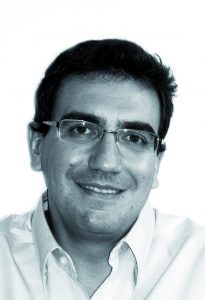Gonzalo Seco-Granados received the PhD degree in Telecommunications Engineering from Univ. Politècnica de Catalunya in 2000 and an MBA from IESE in 2002. From 2002 to 2005, he was member of the technical staff of the European Space Agency, in The Netherlands. Since 2006, he is Assoc. Prof. at the Dept of Telecommunications, Univ. Autònoma de Barcelona. He has been Coordinator of Telecom. Engineering (2007-11) and vicedirector of the School of Engineering (2011-). He coordinates the SPCOMNAV (Signal Processing for Communications and Navigation) group. Gonzalo has authored over 220 papers and has been PI of over 25 research projects. In 2009, he was granted one of the six UAB-Santander Chairs of Technology and Knowledge Transfer. He holds the accreditation of Advanced Research (corresponding to the level of full professor) from the University Quality Agency AQU. In 2015, he was a Fulbright Visiting Scholar at University of California, Irvine.

Gonzalo Seco-Granados
ICREA Academia 2013
Universitat Autònoma de Barcelona (UAB) · Engineering Sciences

Research interests
The focus of his present research is on joint localization and data transmission systems (also referred to as Joint Communication and Positioning systems), specifically on the design of signals and receiving techniques (mainly synchronization and channel estimation methods) to improve the truthfulness of the localization and the integration between both satellite-based and terrestrial communication and positioning solutions. He is also interested in techniques to enhance the robustness and provide signal-level integrity in GNSS receivers operating in difficult environments. The use of several antennas in GNSS receivers is one his long-standing lines of activity. He is currently investigating on the design of positioning solutions exploiting millimeter wave and massive MIMO technologies, in particular in vehicular networks, where both accurate and secure positioning is needed. The designs aim at contributing to the definition of the future 5G wireless systems.
Keywords
Statistical signal processing, navigation/positioning systems, estimation theory, wireless communications, data series analysis, GNSS, 5G systems